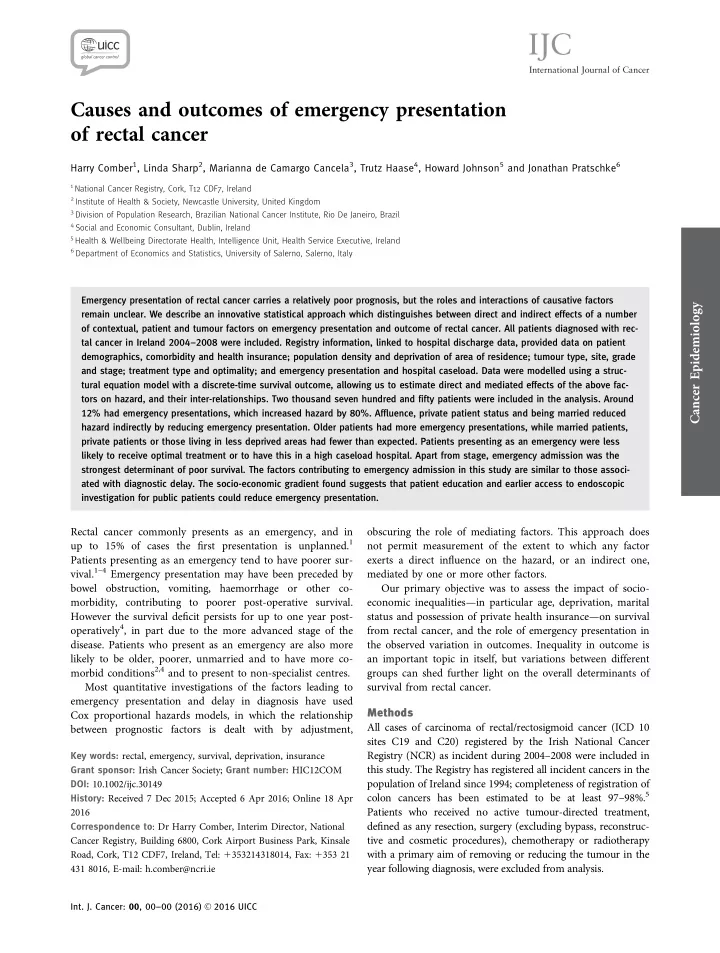

IJC International Journal of Cancer Causes and outcomes of emergency presentation of rectal cancer Harry Comber 1 , Linda Sharp 2 , Marianna de Camargo Cancela 3 , Trutz Haase 4 , Howard Johnson 5 and Jonathan Pratschke 6 1 National Cancer Registry, Cork, T12 CDF7, Ireland 2 Institute of Health & Society, Newcastle University, United Kingdom 3 Division of Population Research, Brazilian National Cancer Institute, Rio De Janeiro, Brazil 4 Social and Economic Consultant, Dublin, Ireland 5 Health & Wellbeing Directorate Health, Intelligence Unit, Health Service Executive, Ireland 6 Department of Economics and Statistics, University of Salerno, Salerno, Italy Emergency presentation of rectal cancer carries a relatively poor prognosis, but the roles and interactions of causative factors Cancer Epidemiology remain unclear. We describe an innovative statistical approach which distinguishes between direct and indirect effects of a number of contextual, patient and tumour factors on emergency presentation and outcome of rectal cancer. All patients diagnosed with rec- tal cancer in Ireland 2004–2008 were included. Registry information, linked to hospital discharge data, provided data on patient demographics, comorbidity and health insurance; population density and deprivation of area of residence; tumour type, site, grade and stage; treatment type and optimality; and emergency presentation and hospital caseload. Data were modelled using a struc- tural equation model with a discrete-time survival outcome, allowing us to estimate direct and mediated effects of the above fac- tors on hazard, and their inter-relationships. Two thousand seven hundred and fifty patients were included in the analysis. Around 12% had emergency presentations, which increased hazard by 80%. Affluence, private patient status and being married reduced hazard indirectly by reducing emergency presentation. Older patients had more emergency presentations, while married patients, private patients or those living in less deprived areas had fewer than expected. Patients presenting as an emergency were less likely to receive optimal treatment or to have this in a high caseload hospital. Apart from stage, emergency admission was the strongest determinant of poor survival. The factors contributing to emergency admission in this study are similar to those associ- ated with diagnostic delay. The socio-economic gradient found suggests that patient education and earlier access to endoscopic investigation for public patients could reduce emergency presentation. Rectal cancer commonly presents as an emergency, and in obscuring the role of mediating factors. This approach does up to 15% of cases the first presentation is unplanned. 1 not permit measurement of the extent to which any factor Patients presenting as an emergency tend to have poorer sur- exerts a direct influence on the hazard, or an indirect one, vival. 1–4 Emergency presentation may have been preceded by mediated by one or more other factors. bowel obstruction, vomiting, haemorrhage or other co- Our primary objective was to assess the impact of socio- morbidity, contributing to poorer post-operative survival. economic inequalities—in particular age, deprivation, marital However the survival deficit persists for up to one year post- status and possession of private health insurance—on survival operatively 4 , in part due to the more advanced stage of the from rectal cancer, and the role of emergency presentation in disease. Patients who present as an emergency are also more the observed variation in outcomes. Inequality in outcome is likely to be older, poorer, unmarried and to have more co- an important topic in itself, but variations between different morbid conditions 2,4 and to present to non-specialist centres. groups can shed further light on the overall determinants of Most quantitative investigations of the factors leading to survival from rectal cancer. emergency presentation and delay in diagnosis have used Methods Cox proportional hazards models, in which the relationship All cases of carcinoma of rectal/rectosigmoid cancer (ICD 10 between prognostic factors is dealt with by adjustment, sites C19 and C20) registered by the Irish National Cancer Key words: rectal, emergency, survival, deprivation, insurance Registry (NCR) as incident during 2004–2008 were included in Grant sponsor: Irish Cancer Society; Grant number: HIC12COM this study. The Registry has registered all incident cancers in the DOI: 10.1002/ijc.30149 population of Ireland since 1994; completeness of registration of colon cancers has been estimated to be at least 97–98%. 5 History: Received 7 Dec 2015; Accepted 6 Apr 2016; Online 18 Apr Patients who received no active tumour-directed treatment, 2016 Correspondence to : Dr Harry Comber, Interim Director, National defined as any resection, surgery (excluding bypass, reconstruc- tive and cosmetic procedures), chemotherapy or radiotherapy Cancer Registry, Building 6800, Cork Airport Business Park, Kinsale with a primary aim of removing or reducing the tumour in the Road, Cork, T12 CDF7, Ireland, Tel: 1 353214318014, Fax: 1 353 21 year following diagnosis, were excluded from analysis. 431 8016, E-mail: h.comber@ncri.ie C 2016 UICC Int. J. Cancer: 00 , 00–00 (2016) V
Recommend
More recommend